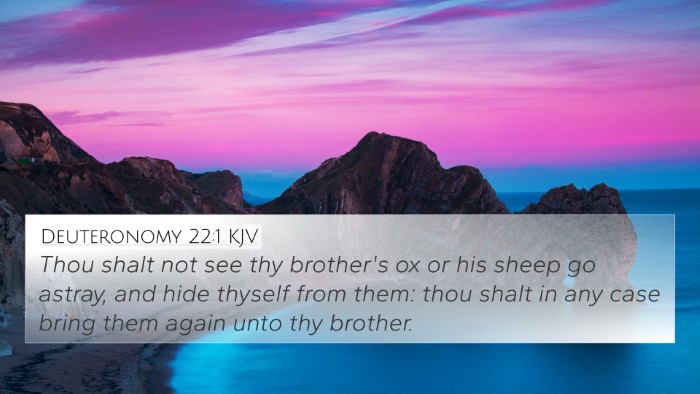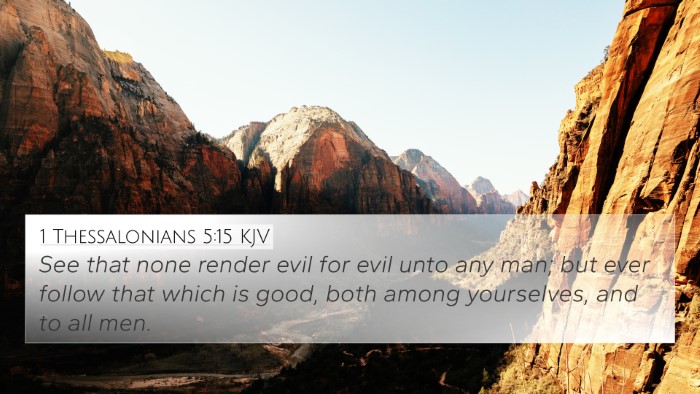Understanding Exodus 23:4
Exodus 23:4 states:
"If you come across your enemy's ox or donkey wandering away, be sure to return it to him."
This verse encapsulates a profound principle of compassion and social responsibility, which resonates deeply within both the Old and New Testaments. Below, we explore the meaning of this verse through the insights of public domain commentaries.
Summary of Commentaries on Exodus 23:4
Matthew Henry's Commentary
Matthew Henry emphasizes the moral implications behind the verse. He notes that even in cases of enmity, one must act righteously. Returning a lost animal exemplifies charity and kindness—even toward one's adversary. This indicates a higher standard of ethical behavior, calling individuals to act with integrity and goodwill, promoting peace even in conflict.
Albert Barnes' Notes
Barnes observes that this directive serves to counteract the natural human inclination to rejoice in the trouble of one's enemies. By mandating the return of lost property, it reinforces the idea of forgiveness and altruism in personal conduct. It teaches the importance of maintaining justice and fairness in human relationships, regardless of one's feelings towards the other individual.
Adam Clarke's Commentary
Adam Clarke highlights the verse's importance as it relates to property rights and the value of personal responsibility. He argues that returning a lost item goes beyond mere legal obligation; it is a testament to one’s character and the moral fabric of society. Clarke connects this principle to broader Biblical themes of stewardship and community, illustrating how our actions towards others reflect our commitment to God's commandments.
Key Themes and Connections
Exodus 23:4 embodies key themes such as:
- Compassion: The act of helping an adversary expresses true empathy.
- Justice: Upholding fairness even while in conflict.
- Moral Responsibility: Taking action to do what is right regardless of personal feelings.
Bible Verse Cross-References
Exodus 23:4 can be cross-referenced with the following verses:
- Deuteronomy 22:1-4: Instructions about helping a lost animal relate closely to the principles of support and care for others, even enemies.
- Luke 10:25-37: The Parable of the Good Samaritan embodies the same virtue of kindness across social divides.
- Proverbs 25:21: This verse reinforces the command to bless one’s enemies through acts of kindness.
- Matthew 5:44: Jesus commands love for enemies, building upon the ideas found in Exodus.
- Romans 12:20: The New Testament reiterates the call to act nobly against adversaries.
- Galatians 6:10: Encourages believers to do good to all, encapsulating the ideal expressed in Exodus 23:4.
- James 2:8: Advocates for the royal law of loving one's neighbor, which includes treating all individuals with respect and care.
Comparative Bible Verse Analysis
In examining the connections between Bible verses, the concept of treating enemies with kindness stands out as a theme woven throughout Scripture. The Old Testament lays down these social principles, while Jesus’ teachings in the New Testament expand upon them, showing continuity in God’s desire for justice, mercy, and community.
Tools and Resources for Bible Cross-Referencing
Utilizing various tools can enhance your understanding of cross-referenced scriptures:
- Bible concordances can help identify phrases and their connections.
- A Bible cross-reference guide provides detailed paths between related verses.
- Bible chain reference methods help trace thematic connections across books.
Conclusion
Exodus 23:4 invites believers to reflect on their moral obligations toward others, emphasizing the power of kindness and integrity. By understanding this verse alongside its biblical cross-references, we not only enrich our knowledge but also deepen our commitment to embodying these teachings in daily life. The repeated call to show compassion highlights an essential aspect of Christianity, nurturing an ethos that prioritizes love and righteousness, transcending personal grievances.










